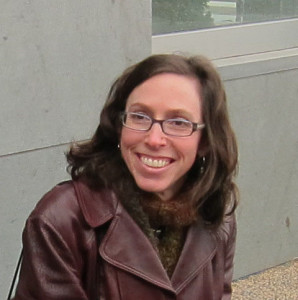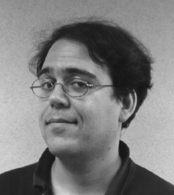Dr. Melissa Haendel
Keynote Title: “Not everyone can become a great artist; but a great artist can come from anywhere”: Envisioning a world where everyone helps solve disease

Elucidating disease and dysfunction requires understanding how genotypic variation relates to phenotypic outcomes. Researchers produce data that are collated to generate hypotheses and novel discoveries, which feed into the clinic, further driving basic research. It is a beautiful cycle, but not all data is created equal along the way and this process can take years and years. Data integration is a key†challenge as phenotype data is largely unstructured and is encoded in a variety of formats. Since we only know the functional consequences of mutation for less than 40% of the human coding genome, maximizing use of these data is critical. Semantically structured phenotype data can be used algorithmically to shed new light on how biological systems function across time and scale. The use†of cross-species anatomy and phenotype ontologies can be combined with genomic analysis to support disease diagnosis. Who is in charge of assisting with the creation of such an infrastructure? The answer is all of us – the clinician, the basic researcher, the author, the biocurator, the informaticist, the publisher, the patient, and more. Here, we explore the bucket brigade that it takes to support a semantic disease discovery framework.
Bio: Dr. Haendel is an Associate Professor in the Library and the Department of Medical Informatics & Clinical Epidemiology at the Oregon Health and Science University (OHSU), where she directs the Ontology Development Group. She is the principal investigator of the Monarch Initiative and is an active researcher in ontologies and data standards. Melissa is known for her work on biomedical resource discovery, such as in the eagle-i discovery system and the Resource Identification Initiative, and for her work on anatomy, cell, and phenotype ontologies such as Uberon and the Human Phenotype Ontology. She holds a Ph.D. Neuroscience from the University of Wisconsin and completed postdoctoral training at the University of Oregon and Oregon State University.
Dr. Bijan Parsia
Keynote Title: Representing All Clinical Knowledge
 Clinical knowledge is voluminous, heterogenous, intertwined, rapidly evolving, and, if we can get it to the right place in the right way at the right time, saves lives. However, in spite of noble and useful efforts at standardisation (think SNOMED-CT), our formal (in the sense of machine processable) representations of medical knowledge remains, if we are charitable, extremely rudimentary. Most useful representations are bespoke, ad hoc, of questionable correctness, and of dubious utility (and these are the useful ones!). Even among experts in narrow areas, synthesising current research into practice or mere practice oriented recommendations is challenging and extremely labour intensive. Disseminating that synthesis widely is backbreaking and surprisingly ineffective. Building medical information systems that reflect, embed, and mobilise our best medical knowledge remains largely a fantasy. Knowledge representation is supposed to help! We have no shortage of possibly helpful technology from RDF and Linked Data, to OWL ontologies, to executable guidelines, to Bayesian networks, to standardise messaging frameworks and beyond. And yet, none of these technologies (or their sum) seem poised to crack the nut. In this talk, I discuss the very idea of representing all clinical knowledge, what it would mean, what the challenges are of doing it, and what benefits, if any, we might hope to achieve.
Clinical knowledge is voluminous, heterogenous, intertwined, rapidly evolving, and, if we can get it to the right place in the right way at the right time, saves lives. However, in spite of noble and useful efforts at standardisation (think SNOMED-CT), our formal (in the sense of machine processable) representations of medical knowledge remains, if we are charitable, extremely rudimentary. Most useful representations are bespoke, ad hoc, of questionable correctness, and of dubious utility (and these are the useful ones!). Even among experts in narrow areas, synthesising current research into practice or mere practice oriented recommendations is challenging and extremely labour intensive. Disseminating that synthesis widely is backbreaking and surprisingly ineffective. Building medical information systems that reflect, embed, and mobilise our best medical knowledge remains largely a fantasy. Knowledge representation is supposed to help! We have no shortage of possibly helpful technology from RDF and Linked Data, to OWL ontologies, to executable guidelines, to Bayesian networks, to standardise messaging frameworks and beyond. And yet, none of these technologies (or their sum) seem poised to crack the nut. In this talk, I discuss the very idea of representing all clinical knowledge, what it would mean, what the challenges are of doing it, and what benefits, if any, we might hope to achieve.
Bio: Dr. Bijan Parsia is a Reader in the School of Computer Science at the University of Manchester. His research focuses on the design and use of logic based knowledge representation, especially those involving description logic based ontologies. He was involved in the OWL 2 Working Group and co-edited several of the specifications. He lead the design and development of the popular OWL reasoner Pellet and the SWOOP editor. He has made notable contributions to reasoner optimisation, extensions to OWL, explanation services, modularity, and empirical ontology engineering. He cofounded the OWL: Experiences and Directions workshop series which provided the impetus and design for OWL 2. He also cofounded the OWL Reasoner Evaluation competition. Currently, he is collaborating with Cerner HS on next generation EMR systems and with Elsevier on question generation for postgraduate medical education.
